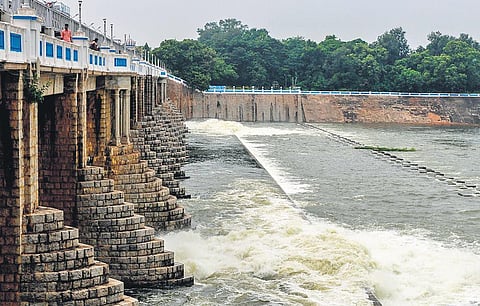

CHENNAI: Chennai needs at least four or five more small reservoirs to store surplus water and meet its drinking water needs, say officials in the Water Resources Department (WRD). The city’s reservoirs — Poondi, Cholavaram, Red Hills (Puzhal Lake), Chembarambakkam, Veeranam, and Thervoy Kandigai — can store 13.213 thousand million cubic feet (tmcft) of water, but Chennai’s requirement is 18 tmcft, the officials explain.
Besides, the demand will increase as the population grows, and hence, efforts are on to increase the city’s water storage capacity. The State government has received proposals to increase Poondi reservoir’s capacity from 3.231 to 5.231 tmcft, and to build channels to link waterbodies in the suburbs. Officials have been waiting for the government’s consent as well as funds.
Plans to build small reservoirs such as Thervoy Kandigai, with a capacity of 0.5 tmcft, aren’t enough, and barrages are needed to store floodwater in monsoon, a senior official says. “Officials recently inspected the confluence point of Kosasthalaiyar river and the Red Hills surplus course near Sadayankuppam. The approximately 1,000 acres of land at the confluence point are likely to prevent seawater intrusion and conserve floodwater that drains into the sea,” the official adds.
He also points out that there were plans to set up surplus courses near Porur and Nemam, but land acquisition would be needed. The team also examined waterbodies and flood-affected areas in southern suburbs such as Medavakkam, Pallikaranai, Narayanapuram, Chitlapakkam, Keelkattalai, and Ottiyambakkam. Such inspections are likely to continue for a few days, after which a detailed project report would be submitted to the State government for approval.
Besides, when the Godavari-Krishna river linking project becomes operational, Tamil Nadu is likely to receive 24 tmcft of water. The ambitious river-linking task will take five to 10 years, and by then, the essential infrastructure must be in place, officials say.